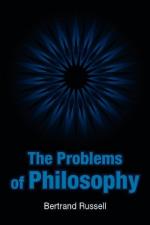|
This section contains 479 words (approx. 2 pages at 400 words per page) |

|
Chapter 9, The World of Universals Summary and Analysis
Relations between objects and beings appear to differ from themselves and yet we have knowledge of them. How can this be? Plato had a theory of this; if we think of justice, it is a relation between persons. Since we think that relations of justice sometimes obtain between persons, there must be an objective, abstract fact about what justice is. Plato calls this pure essence a "Form." However, the Form of Justice is not identical with an instance of justice. The Form is also eternal, immutable and cannot be destroyed.
Plato accordingly believed in a eternal world beyond the sensible one that was the most real world, not a mere shadow of the true world as this one is. Plato's philosophy then sometimes passes into mysticism, but Russell wishes to avoid this. A...
(read more from the Chapter 9, The World of Universals Summary)
|
This section contains 479 words (approx. 2 pages at 400 words per page) |

|




